Exploring Female Consciousness in Urdu Literature: A Seminar with Dr Fatema Hassan
By Zafar Iqbal, PhD

"It is unfortunate that while writers and poets are abundant, serious research and literature are scarce," said Dr Saeed Naqvi, presiding over a seminar on female consciousness. "Fatema Hassan is undoubtedly contributing significantly to this field, and we are fortunate to have her with us this afternoon," he added. Dr Naqvi, a physician by profession and a recognized novelist and critic, also noted that while unconsciousness is inherited, consciousness is learned from one's environment.
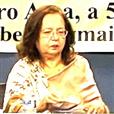
Dr Fatema Hassan |
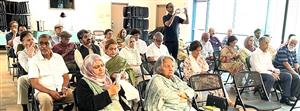
A section of the audience |
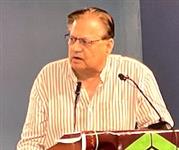
Dr A. Abdullah |

Another group of the audience |

Panelists with Dr Hassan (Nuzaira Azam, Sarwat Zahra, Tasneem Abidi, Saeed Naqvi, Fatema Hassan, and moderator Rahila Firdaus)
|
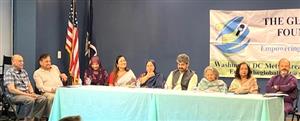
Poets (L to R Yusuf Rahat, A. Abdullah, Naureen Arooba, Sarwat Zahra, Tasneem Abidi, Shakeel Jazib, Shahida Kazmi, Fatema Hassan, and H. Haq) |
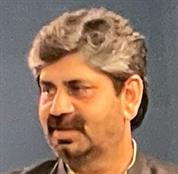
. Dr Shakeel Jazib |
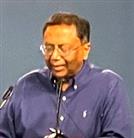
Dr Rizwan Ali |

Rahila Firdaus, moderator
|

Volunteers with Shakeel Jazib (L to R) Dr Zafar Iqbal, Dr A. Abdulla, Nuzaira Azam, Shaeel Jazib, and Asim Ahmad |
The seminar, organized by the Global Beat Foundation and the Literary Society of North America, took place in Arlington, VA, on July 6, 2024. It aimed to have a conversation with Dr Hassan about her recent book, Urdu Shaeraat Aur Nisaee Shaoor - Sau Baras ka Safar.
Feminism focuses on achieving equality, justice, and empowerment for women by addressing issues like gender discrimination, violence, and economic disparity. It aims to dismantle patriarchal structures and advocate for women's rights in education, employment, and politics. In response to questions by panelists, noted journalist Nuzaira Azam, poets Tasneem Abdi, and Sarwat Zahra, and from the audience, it was mentioned that many notable female poets from the Subcontinent have significantly contributed to feminist discourse in Urdu literature. Writers like Ismat Chughtai, Qurratulain Hyder, Fahmida Riaz, Parveen Shakir, Zehra Nigah, Kishwar Naheed, and more recently, Kamila Shamsie and Bina Shah, have used their work to challenge societal norms and highlight women's struggles and aspirations. Through their works, these writers have enriched Urdu literature and contributed to the broader feminist movement, advocating for a more just and equitable society.
Addressing a concern about Urdu not getting its due recognition by the international community, it was mentioned that this is partly because a sizable majority of the Urdu-speaking population in the Subcontinent and those settled overseas in Europe, America, and the Middle East, mention their regional languages as their mother tongue despite Urdu being their language of conversation. The actual number of Urdu-speaking people in the world is increasing, and our young generation, including women, is contributing to Urdu literature around female consciousness.
The session was aptly moderated by Rahila Firdaus, a former PTV anchor who traveled from New Jersey for the program. In the second session, poets from Pakistan and the USA recited their poetry to a captivated audience. Shahida Kazmi, a senior poet recognized in the Urdu literary circle, presided over this session. Noted poets who participated included Shakeel Jazib from Pakistan and Tasneem Abdi from Texas. A. Abdullah, Hafeezul Haq, Rizwan Ali, Sarwat Zahra, and Yusuf Rahat represented the Metro-Washington literary community.
Despite the hot summer and the long weekend celebrating American independence, a large audience from the Metro Washington area and nearby states attended this important event. Representatives from various literary and cultural organizations applauded the seminar and poetry session. Among them were Dr Sher Shah Syed, a noted physician and writer visiting from Pakistan; literary personality Ashraf Jaan; former journalist Batool Basharat; TV commentator Faiz Rehman; Firoze Khan (University of Karachi Alumni Association), Shah Fazal Abbas (Arbab-e-Zauq), Sultana Kamaal (Hyderabad Association of Metro-Washington Area), Tahira Aziz (Urdu Academy of Maryland), and Tariq Farooqi (Aligarh Alumni Association-DC Trustee).
Samples of the poetry recited at the Mushaira .
Host poet Dr Rizwan Ali started the mushaira with his poem.
Na jaane raat Dhale kis paher meiN aankh lage Sarhaane mere paDa eik khwab rahne deiN
Hafeezul Haq recited the following verses:
Yeh mah-o-saal chand baaqi haiN Aur bhi kuchh nahi hai khone ko
Yusuf Rahat —a popular poet from the Washington area entertained the audience with his poem.
Jo chup raheiN to aman ke payamber haiN hum log Baras PaDeN to qaher hain azaab hain hum log
Dr Sarwat Zahra recited her famous poem MeiN khud ko na jaane kahaN bhool aai
Naureen Talat Arooba
Bhala hamari shahadat ko kaun mane ga Hamri aadhi gavahi to muatbar bhi nahiN
Dr A Abdullah recited two short poems Un kahi baateiN and Tera Saath paying tribute to his mother and wife, respectively.
Tasneem Abidi , who came from Houston for the event recited:
Pahle taqdees ke naamoN par mera saud hua Apni hurmat ka main tavan ada karti rahi
Dr Shakeel Jazib - a well-known poet from Pakistan -recited the following verses:
Is se aage ka har ek faisla tujh par choRa Jate jate tujhe hum eik nazar dekhain ge
Dr Fatema Hassan recited her nazm Meri beTi ungli chhoR ke chalna seekh gai hai reflecting changes in female consciousness.
Presiding the mushaira session Ms Shahida Kazmi recited:
MeiN Seeta hoon na Savitri, na Laila hoon na Shirin
Mein apne daur main bahti hui mazboot kashti hooN
Hava ke rukh pey apne badbaan khud khol sakti hooN
She also recited her nazm Aadhi Gavahi on public demand.

